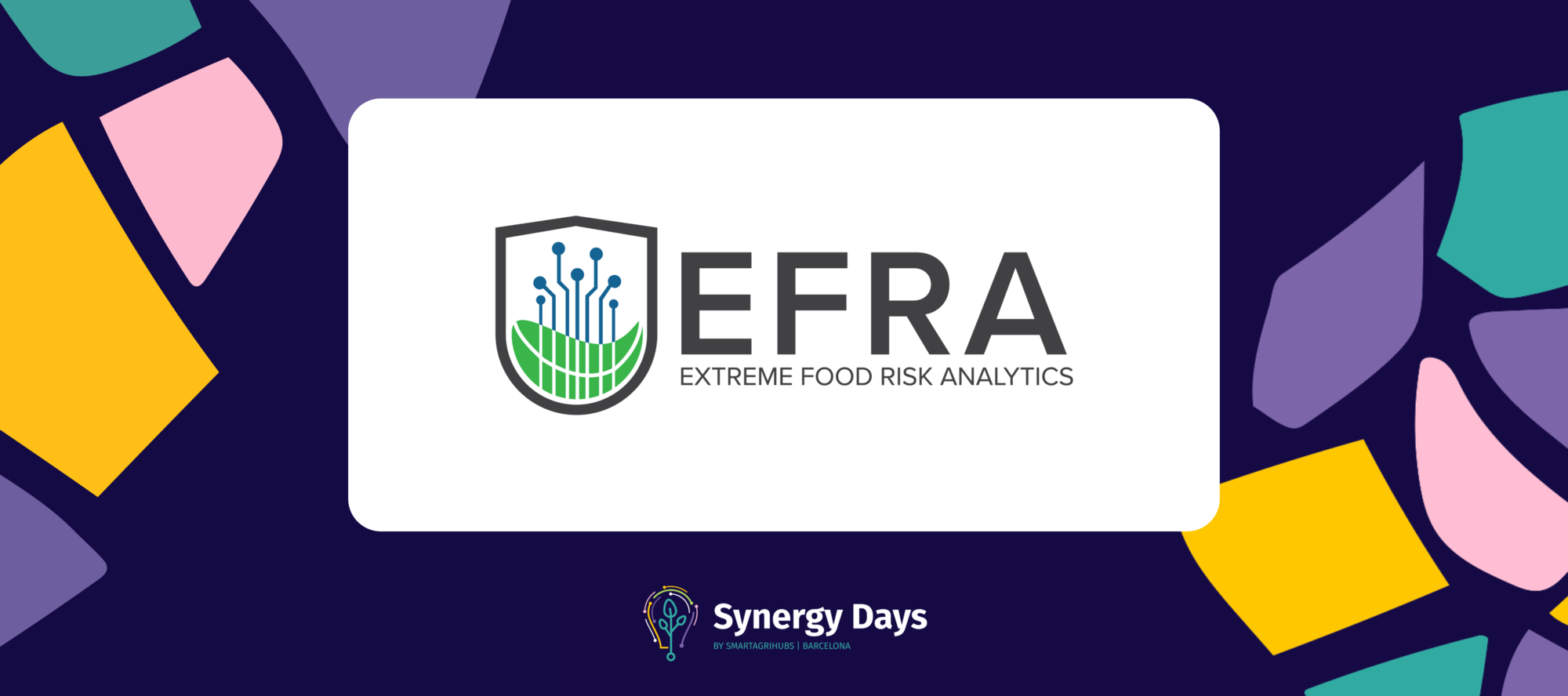Synergy Days 2024 projects: EFRA

Synergy Days is designed to celebrate and showcase European research projects that are transforming the European agri-food sector. Who are they, and how are they using digital technology to innovate the sector? We spoke to EFRA to learn more about the project, its goals and journey.
About EFRA
EFRA explores how extreme data mining, aggregation and analytics may address major scientific, economic and societal challenges associated with the safety and quality of the food that Europeans eat. EFRA will design and deploy tools and undertake initiatives to facilitate their uptake, elicit feedback, and engage stakeholders. The EFRA consortium is expert and innovation driven. It comprises 9 partners from 7 different countries representing universities and research institutes, technology and consulting companies, a certification body and a food processing company.
Learn more on their website.
What inspired the creation of your project?
The Extreme Food Risk Analytics (EFRA) project was inspired when the consortium spotted the need to address some major scientific, economic, and societal challenges associated with food safety and quality in Europe. Considering that around 1 million deaths annually are attributed to unhealthy diets in the EU, alongside 1.2 million reported cases of foodborne diseases, the partners strongly believe that it should be an international priority to improve food risk prevention measures. Our goal is to utilize extreme data mining, aggregation, and analytics to transform food safety practices from reactive to proactive. The project aims to develop advanced solutions to discover and distill food risk data from diverse, multilingual, and often scarce sources. The integration of technologies such as AI, IoT, and big data, EFRA will help create a robust ecosystem for food safety stakeholders to share data and infrastructure, to ensure safe food for consumers around the world.
Can you share some of the key milestones or successes your project has achieved to date?
As of October 2024, 22 months have passed since the beginning of the project. During these, EFRA has achieved several key milestones. Notably, the team has developed the EFRA Data Hub, which employs intelligent crawlers and data annotation modules to mine, process, and link dispersed food safety data sources. In addition, the EFRA Analytics Powerhouse stands as another significant achievement, running over a green cloud HPC to distill insights from the Data Hub to train privacy- preserving AI models. Our project has also launched the EFRA Data & Analytics Marketplace, a user-friendly web application facilitating the discovery and use of food safety data and AI models. Moreover, EFRA has successfully piloted its technologies in real-world scenarios, such as predicting poultry pathogens and optimizing pesticide use for food safety.
What innovative technologies or methods are you most excited about within your project?
EFRA is in a unique position to leverage innovative technologies that are both exciting and promising. Our Data Hub uses state-of-the-art natural language processing (NLP) to extract vital information from multilingual food safety texts. The Analytics Powerhouse takes advantage of AI and machine learning techniques to predict food risks with high accuracy, while making sure that energy efficiency and privacy preservation are prioritized. Finally, and by integrating IoT devices and big data management systems, the team can collect and analyze big amounts of environmental, genomic, and supply chain data in real-time. These innovations help us create highly tailored prediction and proactive measures around food safety, therefore greatly enhancing our ability to prevent food safety incidents before they occur.
What advice would you give to other innovators looking to make an impact in the agricultural / food sector through digital technologies?
There are several sectors that innovators in the agricultural and food sectors should focus on if they wish to make an impact. To begin with, they should focus on the integration of diverse data sources in order to create comprehensive insights. By leveraging advanced technologies such as AI, IoT, and big data, they can revolutionize traditional practices and improve the decision-making processes. Second, they should ensure that solutions are user-friendly and accessible to a variety ofstakeholders, from farmers to policymakers. It is vital to connect with end-users through focus groups and real-world pilots to provide constructive feedback and increase adoption. Finally, they should emphasize sustainability and energy efficiency in technological developments to align with European and global environmental goals and ensure long-term viability.
What is the added value of Synergy Days for your project?
Synergy Days provide an excellent platform for EFRA partners to showcase our achievements, while engaging with stakeholders and exploring future collaborations. The event offers the opportunity to share our innovative technologies and methodologies with a broad audience consisting of experts, policy makers, industry players, alongside the general public. The interactions and feedback that will occur during Synergy Days are crucial for refining our approaches and ensuring that our solutions meet the needs of the dynamic agricultural and food sectors. Synergy Days will -like last year- foster a collaborative environment that promotes further innovation and creates a lasting impact in the wider food safety sector.
Want to meet them and learn more about the project? Join EFRA at Synergy Days 2024! More details and how to register.